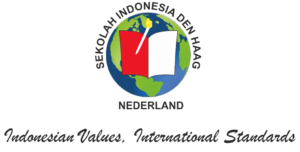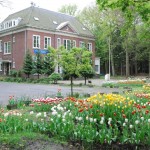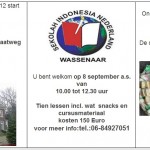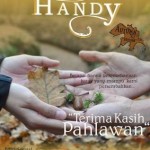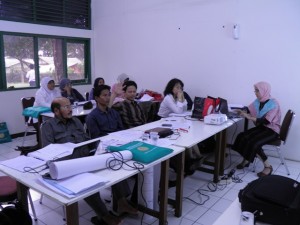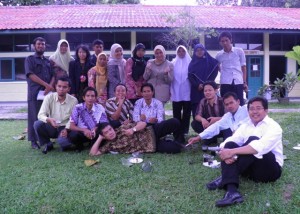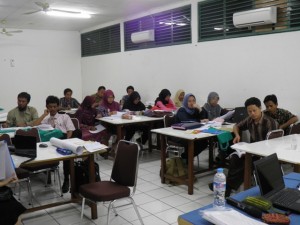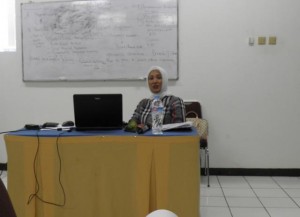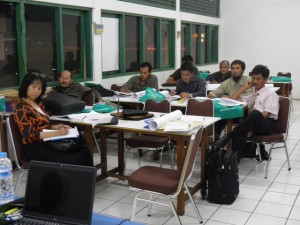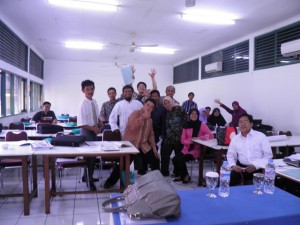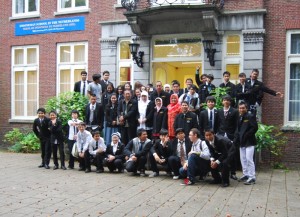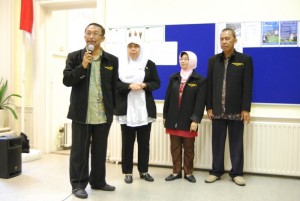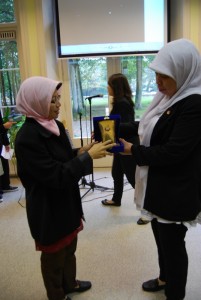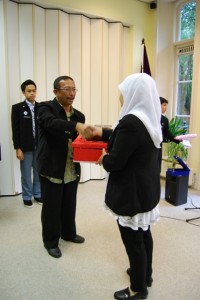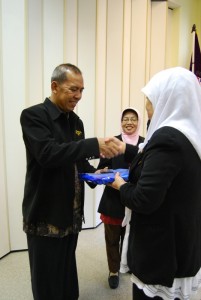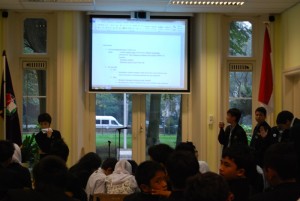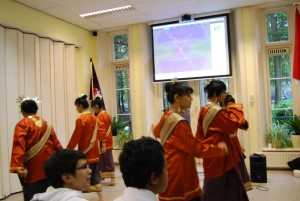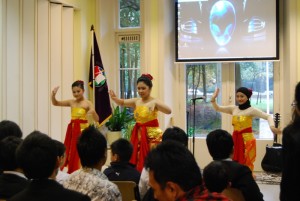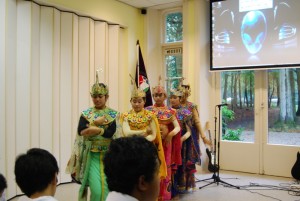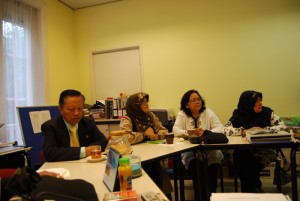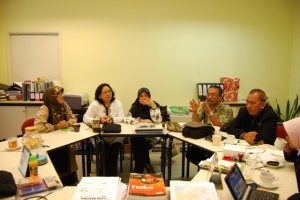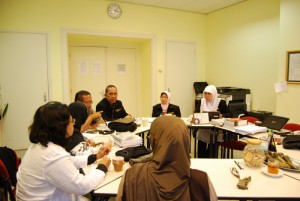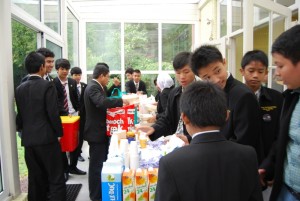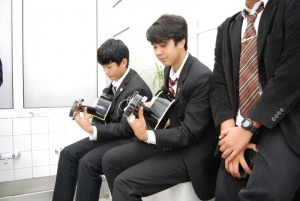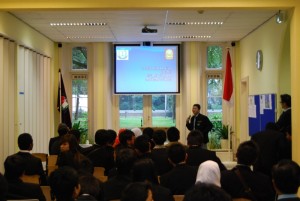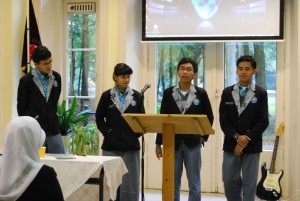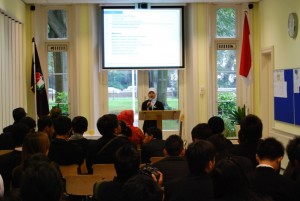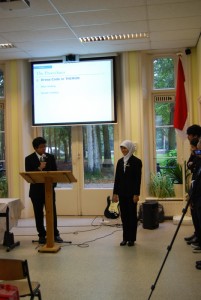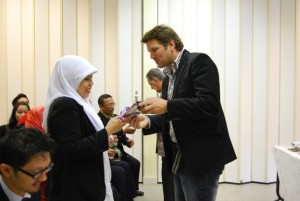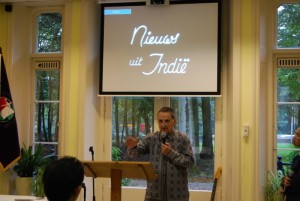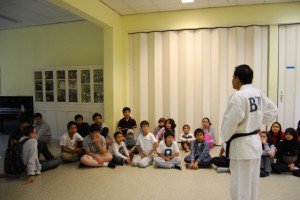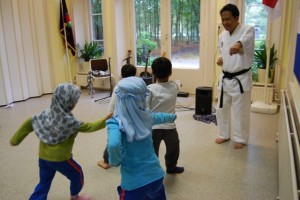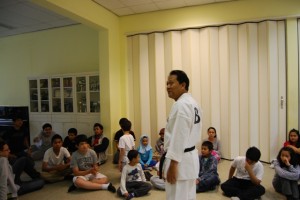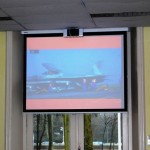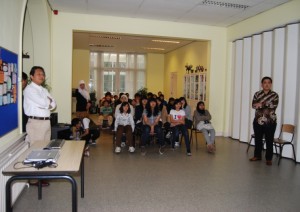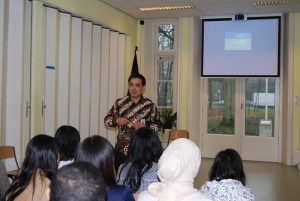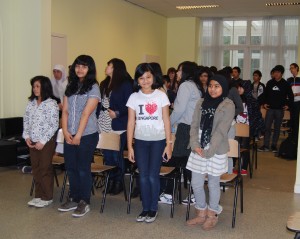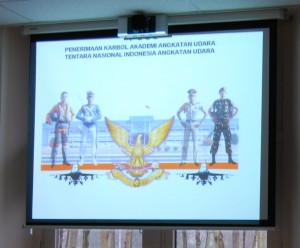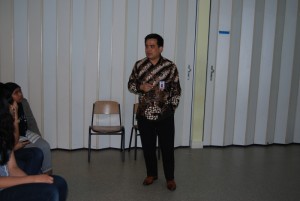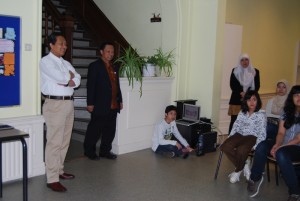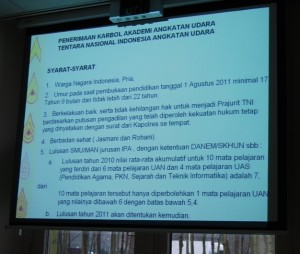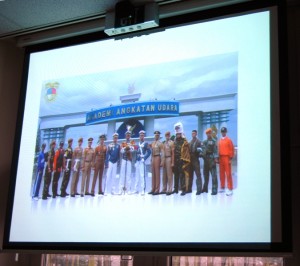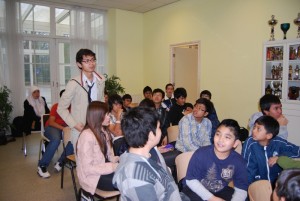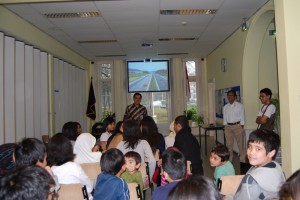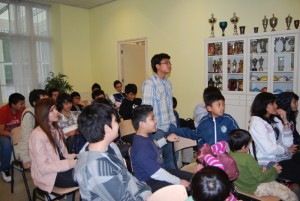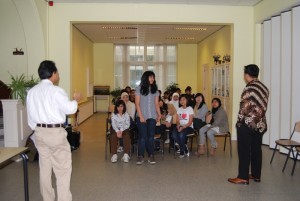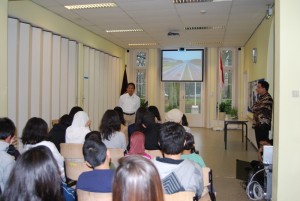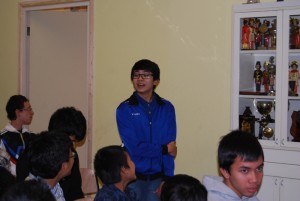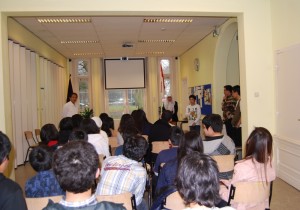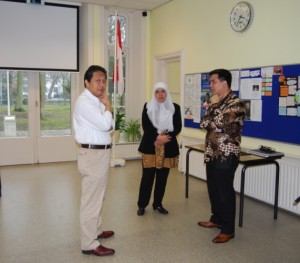By Rasyida Noor (The Ambassador/Class XII Natural Science)
This year is the XLIV Annual Session of The Hague International Model United Nations (THIMUN), held from 22nd-27th January 2012 at the World Forum Convention Centre, The Hague. This year’s general theme is “Seas and Oceans”. SIN Wassenaar was assigned to represent the Republic of San Marino with the selected students representing our school consisted of:
1. RASYIDA NOOR (GENERAL ASSEMBLY 1st Committee/Ambassador)
2. AYU PUSPITA ASRI (GENERAL ASSEMBLY 2nd Committee)
3. NADIRA FEBRIANTI (GENERAL ASSEMBLY 3rd Committee)
4. SALSABILA ZAKIYYAH (GENERAL ASSEMBLY 4th Committee)
5. MUHAMMAD IQBAL NASUTION (DISARMAMANET COMMISSION/Sub-Commission 1)
6. RICHARD VAN DER KRUIT (HUMAN RIGHTS COMMISSION/Sub-Commission 1)
7. ANNISA ZOONTJES (SPECIAL CONFERENCE/Sub-Commission 1)
8. RIZKI AMALIA LAKSMIPUTRI (ENVIRONMENT COMMISSION/Sub-Commission 1)
Our delegation had prepared for this event since November 2011. At that time, all the students that haven’t participate in THIMUN were invited to join the English Debating Team (EDT) Camp 1 at SIN Wassenaar’s student dormitory. Our THIMUN seniors from the previous years facilitated and organized this activity, so everyone who joined the EDT Camp could grasp and understand about THIMUN and its procedures. The EDT Camp 1 was held for 3 days. Day one, we received general explanation from the seniors about THIMUN itself. We also got lists of countries we had to represent and also the issues for our resolution. In the following day, we do the lobbying process, and on the next day, we went to SIN Wassenaar to refine our debating skills, and technical problems. The EDT Camp 1 was very exciting.
The preparation was continued in January though the EDT Camp 2, for which we received a trainer, Ms. Syafreni who guided and supervised us in preparing the resolutions. It was held every weekend before THIMUN. This time, we could be more focused on our resolutions, how to understand the issues well, to find possible solutions from the issue, and write a good resolution that could be debated.
And finally, after weeks of practicing, we finally attended THIMUN 2012 at the World Forum, The Hague. At first, we all got so nervous because it was our first time to attend an MUN event, especially the colossal THIMUN. Everyday’s activity was started at nine o’clock. So we had to wake up early to catch the bus and tram to the World Forum. At the World Forum we met hundreds of people from different countries, also different nationalities, representing UN’s countries. When we got into the building, our delegation was delegated to eight different rooms on different floors, according to each assigned committee/commission.
On Monday, we received a briefing from our Chairs and then took part in the lobbying process. At this phase, the delegations had to discuss about the resolutions based on the issue they focused on. The delegates discussed solutions, merged their ideas, made alliance, and gathered co-submitters, so their resolutions could be debated in the forum. At 15.00, our delegation attended the Formal Opening of THIMUN 2012. There were opening speeches and flag parade.
On Tuesday there were opening speeches of General Assembly, Commissions, and Special Conference. After the speeches, every committee/commission proceeded to the debate phase. In the debate time, every delegation that already submitted their resolutions presented their resolutions and explained it in a persuasive way, to get the House’s vote.
During the debate time, there were several rules and procedures that had to be adhered by the delegations. There were also several motions and specific statements that could be used in the forum. Every delegate was required to obey these rules and use standard parliamentary language. The general stages of debating time was explanation and short speech from submitter, in favour, against, amendment, and finally the voting procedure. The resolution that passed on the forum would be brought to the plenary sessions of THIMUN 2012.
On Friday, we had to attend the plenary session for every committee/commissions, and finally, the closing ceremonies. The closing ceremony was very spectacular. It involved marching band accompanying the flag parade brought by the ambassadors from every delegation.
For our delegation, THIMUN had been unforgettable. Started with our routine to catch up the bus every morning so we would not be late. On a certain day, we’re almost late because the first bus didn’t stop at the bus shelter as usual. So we had to run to catch up the tram to the World Forum.
Every delegate from the delegation of San Marino has their own story. For example, in GA1, our delegation found that the debate session in this committee was very intense. They tended to put down a resolution rather than negotiation to generate cooperation among them. But the people were actually friendly and nice. In GA2, it was full of brilliant ideas from the delegates, and our delegation found that it was nice to be in GA2, because the people in that forum could put everything together, so they could cooperate well. Our delegation for the Environmental Commission (EC) said that her forum was very nice and friendly. People in there were very kind – they voted in favour for almost all of the debated resolutions. In the end of the event, they even make a ‘Wall of Chair’ to express their gratitude to the Chairs. Different from the EC, our delegation in the Disarmament Commission got many new friends in his forum. Lunch time was also one of our favourite times, because we could meet people from another committee and got acquainted. For example, we met the delegation from one school from Singapore. They were very nice and we talked a lot about our schools. We also met these foreign people who had lived in Indonesia for years, so we had a chance to discuss about our shared experiences.
THIMUN had been an unforgettable event for most of the delegations. It is a great experience for every young student from all over the world to gather in one forum, discussing ideas, try to find solutions to the worldwide problems. As for our delegation, THIMUN has been a valuable experience we won’t get in any other places. In THIMUN, we met hundreds of people from foreign schools. We met different nationalities, different cultures, and languages. We got many benefits from this event. We could improve our English skill by talking to the native speakers from different countries, beside that we could comprehend the system and procedures of the United Nations in mini scale, and to experience how to be a real UN diplomat, and also, by trying to draft resolutions we were involved in thinking and finding out the solutions for worldwide problems; we gained more knowledge about international issues, and of course the most important thing is, we could get so many friends from schools around the world, so we could build an international network that would bring more mutual benefits in the future. We hope that more students can experience this kind of event, so they can learn how important it is for being part of an international community. Without any doubt, we frankly acknowledge that THIMUN 2012 has been an amazing experience for the delegation of San Marino.
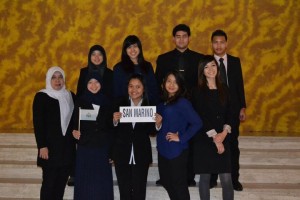
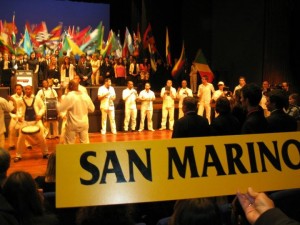
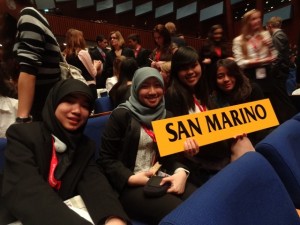
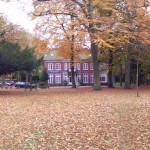 Tidak ada keraguan bahwa salah satu topik paling hangat di dunia IT saat ini adalah cloud computing. Dengan segudang keuntungan bagi dunia bisnis, banyak organisasi dan perusahaan yang mentransformasi infrastruktur ITnya ke model cloud computing. Sayangnya sisi positif ini membawa rumor tidak sedap sehingga membuat hati para profesional IT menjadi galau. Rumor tersebut menyebutkan cloud computing akan menurunkan tingkat kebutuhan industri akan tenaga profesional IT. Dengan kata lain, akan banyak pekerja IT yang kehilangan pekerjaan. Apakah rumor itu benar? (Cont.)
Tidak ada keraguan bahwa salah satu topik paling hangat di dunia IT saat ini adalah cloud computing. Dengan segudang keuntungan bagi dunia bisnis, banyak organisasi dan perusahaan yang mentransformasi infrastruktur ITnya ke model cloud computing. Sayangnya sisi positif ini membawa rumor tidak sedap sehingga membuat hati para profesional IT menjadi galau. Rumor tersebut menyebutkan cloud computing akan menurunkan tingkat kebutuhan industri akan tenaga profesional IT. Dengan kata lain, akan banyak pekerja IT yang kehilangan pekerjaan. Apakah rumor itu benar? (Cont.)